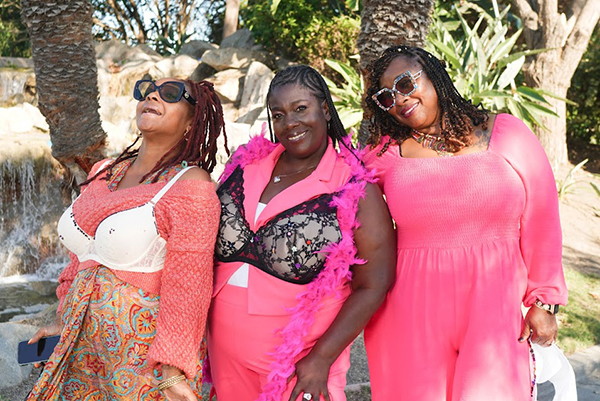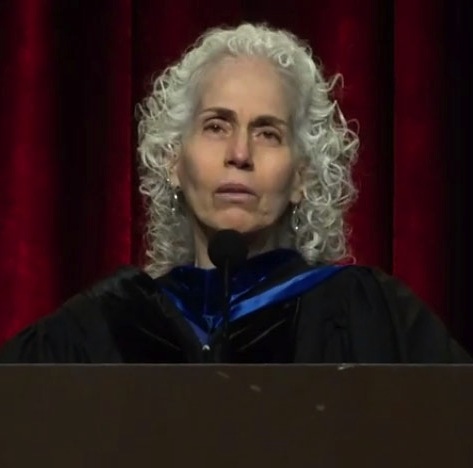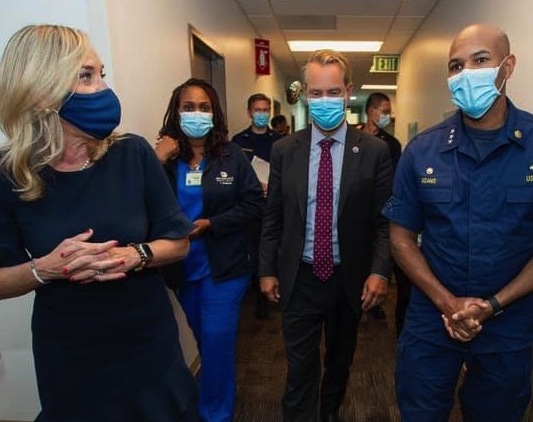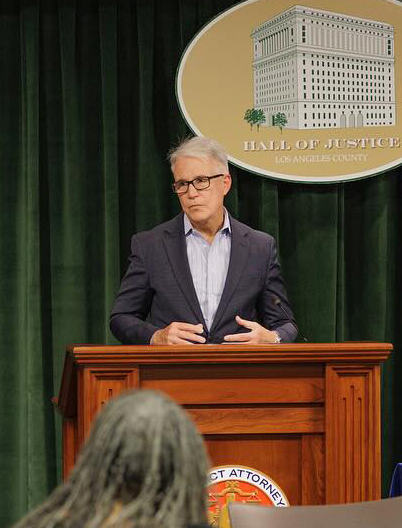Black women are more prone to breast cancer than others

Women take part in a Breast Cancer Awareness Month event in Long Beach Oct. 19. The event was sponsored by Black Women for Wellness LA.
Courtesy photo
By Darlene Donloe
Contributing Writer
LOS ANGELES — Every October, the nation turns pink to acknowledge National Breast Cancer Awareness Month, a time dedicated to educating the public about breast cancer’s impact, promoting early detection and advocating for timely, high-quality care.
For nearly four decades, this annual campaign has pushed for advancements in research, treatment, and support. Yet, beneath the pink ribbons and awareness campaigns lies a stark reality: breast cancer disproportionately affects Black women, who are 40% more likely to die from the disease than white women. It also shows that the breast cancer mortality rate declined for Black women by about 1.5% per year from 2019 to 2023.
Black Women for Wellness LA, an organization that has taken the lead on advocating for Black women’s health, including breast care, has hosted a campaign entitled “From Sexualized to Sacred: Reclaiming Black Women’s Breast Health.”
“For too long, Black women’s breasts have been sexualized, stigmatized, and ignored in health care systems, contributing to higher breast cancer mortality and disparities in care,” said Arnedra Jordan, program manager for Black Women for Wellness LA.
She said the campaign reframes breast health as sacred, powerful and worthy of care, ensuring Black women are seen, heard and supported in their wellness journeys.
“That’s one of the reasons we decided to launch the campaign,” said Jordan, who has been with Black Women for Wellness LA. for five years. “One of our founders found a lump in her breast 30 years ago. The founders decided that women need to take care of themselves.
“When they started the program they just wanted to educate. Eating right, exercise, wearing correct bras, or not to wear a bra, women needed to be educated about it all. We want to take care of the whole women and whole girl. We educate women on pap smears, mental health, diabetes, walking and eating healthier. We are a vegetarian organization, so we want women to learn how to cook healthier.”
The organization has a Keep in Touch program that allows women to get together to talk about their needs and with each other.
“Thirty years later, we have reached out to 5,000 women,” said Jordan, a single mother of two.
“On October 25, we will offer free mammograms and manicures,” she added. “We also want women to feel sexy whether they have one breast, or no breast. We also host a lingerie fashion show, featuring breast cancer survivors and everyone affected by cancer.”
Jordan, 48, who has taught political science at West Los Angeles College for 13 years, said Black Women for Wellness LA, believes the sexualization and stigmatization of Black women’s breasts contribute to the disparities in breast health care.
“What we thought about was, back in slavery Black women fed all the kids,” she said. “Look at the videos today. We’re in the videos, a lot of times because our breasts might be bigger. Some women won’t go to the doctor. We decided to start those conversations and make a safe space.”
Black Women for Wellness LA wants Black women to understand that health care is a right.
“You have the right to be heard, go to the doctor and be treated with fairness,” Jordan said. “Everyone needs to be educated. Treat people fairly across the board. Some think, ‘Oh, they are poor. We won’t treat them.’ Everyone needs access.”
“Early detection saves lives,” said Dr. Celina M. Nadelman, a board certified cytopathologist. “Dispelling myths, ensuring equitable access to screening and empowering individuals to understand their own risk are essential steps in reducing breast cancer mortality.”
Nadelman said delays in follow-up care after an abnormal mammogram, barriers to high-quality health care access and differences in tumor biology are just a few factors contributing to the survival gap.
A representative from Susan G. Komen, the world’s leading breast cancer organization, which advocates for patients, drives research breakthroughs, improves access to high-quality care, offers direct patient support and empowers people with trustworthy information, said patient navigation “Is an effective strategy to improve breast cancer outcomes for Black patients by addressing systemic barriers to care and ensuring timely screening, diagnosis and treatment.”
According to the Susan G. Komen organization, even after accounting for income and access to care, Black women are still diagnosed with more advanced breast cancers and have worse survival rates than white women.
Komen has a free toolkit called “Empowered: A Breast Guide for College Queens” to give important information to young Black women.
On Oct. 26, Susan G. Komen will convene breast cancer survivors, those living with metastatic breast cancer and supporters at the 2025 Los Angeles More Than Pink Walk at Los Angeles State Historic Park to raise money for Komen’s mission.
Another event, Worship in Pink, is Komen’s year-round, national breast health educational outreach program focused in faith-based communities. While it is available to all faith-based communities, there is a focus on Black and Latino communities.
Susan G. Komen and the National Breast Cancer Foundation promote breast cancer awareness, provide resources for patients and survivors, and fund research into the disease.
Their efforts have contributed to a 44% reduction in breast cancer mortality in the United States since 1989.
Breast cancer affects 1 in 8 women in the U.S. and 1 in 1,000 men in their lifetime.
“While breast cancer is much more common in women, men account for about 1% of all cases,” Dr. Nadelman said. “Men often present later because they don’t realize they’re at risk.”
In 2025 alone, an estimated 316,950 women in the U.S. will be diagnosed with breast cancer and 42,170 women will die from the disease.
Approximately 2,800 men will be diagnosed with breast cancer and 510 will die from it. However, some experts say one-third of breast cancer deaths in the U.S. could be prevented with universal access to modern treatments.
In California, approximately 32,860 women will be diagnosed with breast cancer and 4,620 will die from the disease this year.
Susan G. Komen provides direct support to California residents through its Patient Care Center.
During October, women are encouraged to take action to support the fight against breast cancer by getting screened with regular mammograms and self-exams can help detect breast cancer early, donating to and supporting organizations that fund breast cancer research and provide resources for patients, also by spreading awareness by sharing information about breast cancer and the importance of early detection with the community, and advocating for policies that improve access to healthcare and breast cancer care for all.
Darlene Donloe is a freelance reporter for Wave Newspapers who covers South Los Angeles. She can be reached at ddonloe@gmail.com.





